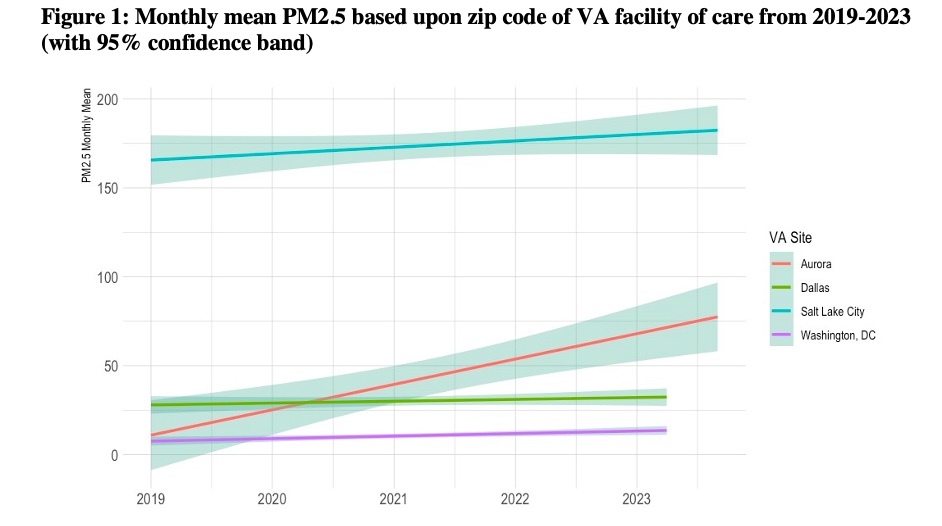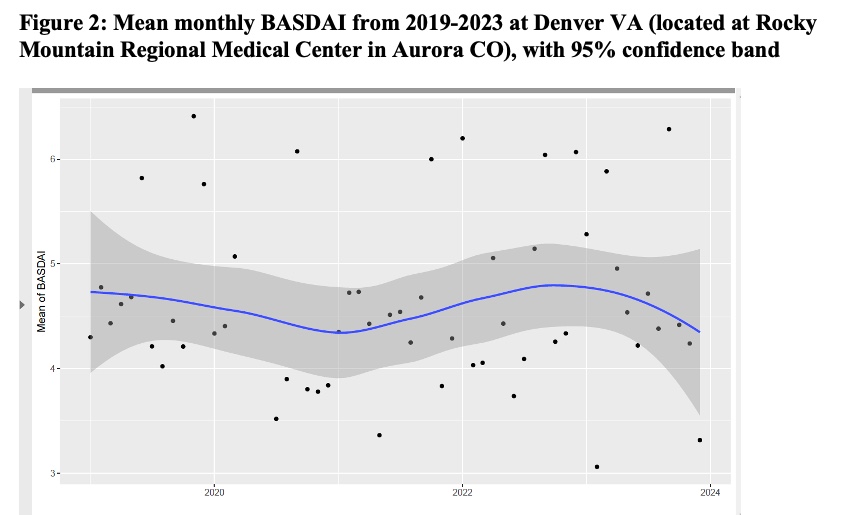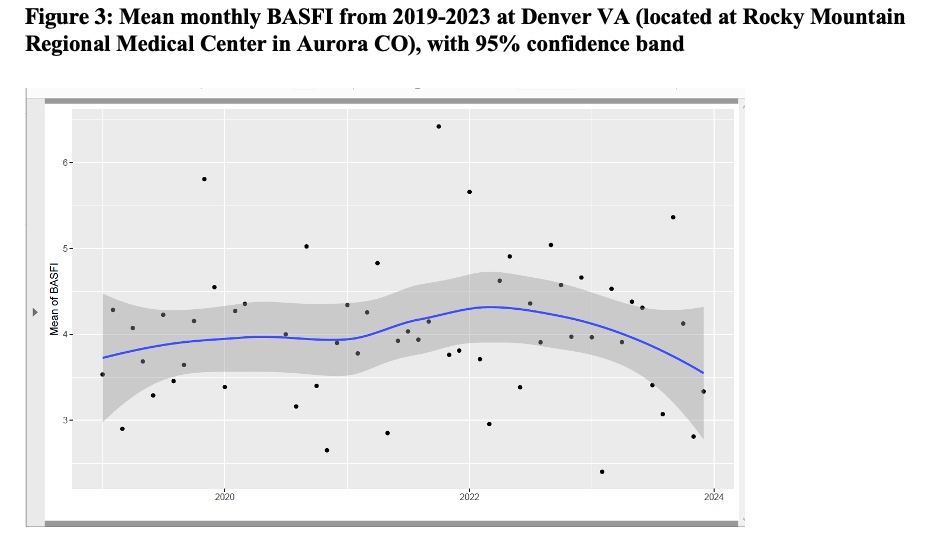Session Information
Session Type: Poster Session C
Session Time: 10:30AM-12:30PM
Background/Purpose: Acute exposure to air pollution has been associated with flares of psoriasis and chronic inflammatory arthritides in prior studies. However, the impact of air pollution, specifically particulate matter 2.5 (PM2.5) exposure, on rheumatic disease remains an important area of inquiry, and patient registries with linked clinical and biobank data are a valuable resource to study disease activity. The PULSAR (Program to Understand the Longterm Outcomes in Spondyloarthritis) registry is a multi-site longitudinal registry of Veterans Health Administration patients with spondyloarthritis. Using the PULSAR registry, we provide a framework to assess the readiness of multi-site patient data sources as a resource to study the impact of PM2.5 exposure on disease activity in spondyloarthritis (namely BASDAI and BASFI measures).
Methods: We performed a multi-site descriptive study using a longitudinal cohort of spondyloarthritis patients. We excluded PULSAR sites with fewer than 100 subjects and those that did not have disease activity measures recorded. We used the zip code of the VA facility of care to determine the ambient PM2.5 level. The purpose of this methodology was to determine whether there were observed fluctuations in PM2.5 level in the region that could inform future analyses. The VA sites at Denver (VA site located in Aurora CO) and Salt Lake City demonstrated fluctuations in mean monthly PM2.5 level (Figure 1). We then assessed the cadence of BASDAI and BASFI measurements longitudinally and found that Denver had regular mean monthly (of all subjects seen at the facility during that month) disease activity measurements over 2019-2023 (Figures 2-3). We also performed additional exploratory analyses to better characterize the cadence of disease activity measures at the VA sites.
Results: Four PULSAR sites qualified for inclusion in our study (Dallas, Denver, Salt Lake City, and Washington DC). We obtained EPA Air Quality data for monthly mean PM2.5 exposures from 2019-2023 at these sites (Figure 1). We found that Denver had evidence of fluctuations in ambient PM2.5 at the facility level from 2019-2023 (Figure 1), as a well as a regular cadence of mean monthly BASDAI and BASFI measurements among its participants (Figures 2-3). We also found that Denver continued regular annual enrollment of new participants into the registry (39 in 2019, 14 in 2020, 41 in 2021, 19 in 2022, 37 in 2023). In addition, Denver had a total of 372 and 335 patients with two BASFI and BASDI observations within six months of one another, respectively, since the inception of the registry in 2007. This suggests that Denver may be amenable to future case-only studies investigating the relationship between acute air pollution exposure and rheumatic disease flares.
Conclusion: Our exploratory framework, based on sample size, PM2.5 patterns and cadence of individual-level disease activity data, can be used to assess large multi-site data sources as a tool for further study of the impact of acute PM2.5 exposure on disease activity in spondyloarthritis. It can be applied to inform the design of longitudinal case-only and case-control study designs to examine the relationship of acute PM2.5 exposure and disease activity in spondyloarthritis.
To cite this abstract in AMA style:
Stolyar L, Mar D, Liu Y, Velasquez E, Sharpe o, Weisman M, Caplan L, Tamang s. Assessing the PULSAR (Program to Understand the Longterm Outcomes in Spondyloarthritis) Registry for Environmental Determinants of Heath Research [abstract]. Arthritis Rheumatol. 2024; 76 (suppl 9). https://acrabstracts.org/abstract/assessing-the-pulsar-program-to-understand-the-longterm-outcomes-in-spondyloarthritis-registry-for-environmental-determinants-of-heath-research/. Accessed .« Back to ACR Convergence 2024
ACR Meeting Abstracts - https://acrabstracts.org/abstract/assessing-the-pulsar-program-to-understand-the-longterm-outcomes-in-spondyloarthritis-registry-for-environmental-determinants-of-heath-research/



